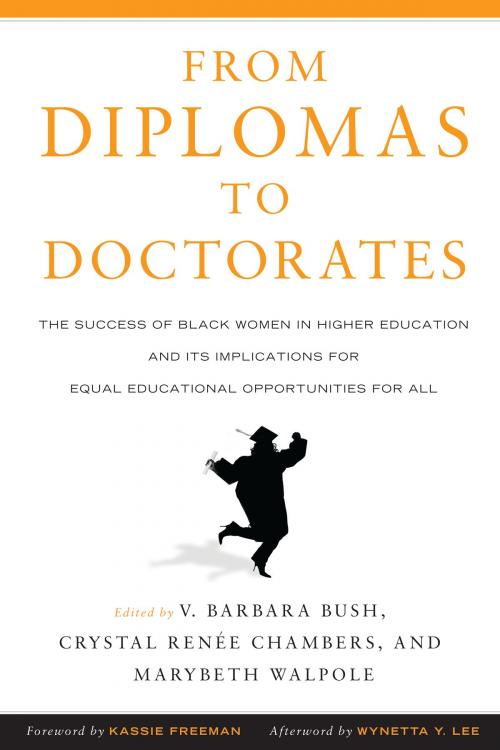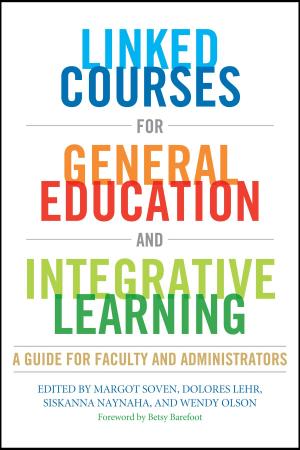From Diplomas to Doctorates
The Success of Black Women in Higher Education and its Implications for Equal Educational Opportunities for All
Nonfiction, Reference & Language, Education & Teaching, Higher Education| Author: | ISBN: | 9781579225308 | |
| Publisher: | Stylus Publishing | Publication: | March 12, 2012 |
| Imprint: | Stylus Publishing | Language: | English |
| Author: | |
| ISBN: | 9781579225308 |
| Publisher: | Stylus Publishing |
| Publication: | March 12, 2012 |
| Imprint: | Stylus Publishing |
| Language: | English |
This volume is designed to illuminate the educational experiences of Black women, from the time they earn their high school diplomas through graduate study, with a particular focus on their doctoral studies, by exploring the commonalities and the uniqueness of their individual paths and challenges. The chapters of this volume newly identify key factors and experiences that shape Black women’s engagement or disengagement with higher education.
The original research presented here – using an array of theoretical lenses, as well as qualitative and quantitative methods – not only deepens our understanding of the experiences of African American women in the academy, but also seeks to strengthen the academic pipeline, not only for the benefit of those who may have felt disenfranchised in the past, but for all students.
The contributors eschew the deficit-focused approach – that implies a lack of social and cultural capital based on prior educational experiences – adopted by many studies of non-dominant groups in education, and instead focus on the strengths and experiences of their subjects. Among their findings is the identification of the social capital that Black women are given and actively acquire in their pre-collegiate years that enable them to gain greater returns on their educational investments than their male peers. The book further describes the assistance and the interference African American women receive from their peers during their transition to college, and how peer interactions shape their early college experiences, and influence subsequent persistence decisions.
Whether studying how Black women in the social and natural sciences navigate through this often rocky terrain, or uncovering the extent to which African American women doctoral students access postsecondary education through community colleges, and their special needs for more mentoring and advising support, this book provides researchers and graduate students with rich information on how to successfully engage and succeed in the doctoral process.
It also demonstrates to women faculty and administrators how they can become better navigators, guides, and advocates for the African American women who come after them.
The original research presented here – using an array of theoretical lenses, as well as qualitative and quantitative methods – not only deepens our understanding of the experiences of African American women in the academy, but also seeks to strengthen the academic pipeline, not only for the benefit of those who may have felt disenfranchised in the past, but for all students.
The contributors eschew the deficit-focused approach – that implies a lack of social and cultural capital based on prior educational experiences – adopted by many studies of non-dominant groups in education, and instead focus on the strengths and experiences of their subjects. Among their findings is the identification of the social capital that Black women are given and actively acquire in their pre-collegiate years that enable them to gain greater returns on their educational investments than their male peers. The book further describes the assistance and the interference African American women receive from their peers during their transition to college, and how peer interactions shape their early college experiences, and influence subsequent persistence decisions.
Whether studying how Black women in the social and natural sciences navigate through this often rocky terrain, or uncovering the extent to which African American women doctoral students access postsecondary education through community colleges, and their special needs for more mentoring and advising support, this book provides researchers and graduate students with rich information on how to successfully engage and succeed in the doctoral process.
It also demonstrates to women faculty and administrators how they can become better navigators, guides, and advocates for the African American women who come after them.
This volume is designed to illuminate the educational experiences of Black women, from the time they earn their high school diplomas through graduate study, with a particular focus on their doctoral studies, by exploring the commonalities and the uniqueness of their individual paths and challenges. The chapters of this volume newly identify key factors and experiences that shape Black women’s engagement or disengagement with higher education.
The original research presented here – using an array of theoretical lenses, as well as qualitative and quantitative methods – not only deepens our understanding of the experiences of African American women in the academy, but also seeks to strengthen the academic pipeline, not only for the benefit of those who may have felt disenfranchised in the past, but for all students.
The contributors eschew the deficit-focused approach – that implies a lack of social and cultural capital based on prior educational experiences – adopted by many studies of non-dominant groups in education, and instead focus on the strengths and experiences of their subjects. Among their findings is the identification of the social capital that Black women are given and actively acquire in their pre-collegiate years that enable them to gain greater returns on their educational investments than their male peers. The book further describes the assistance and the interference African American women receive from their peers during their transition to college, and how peer interactions shape their early college experiences, and influence subsequent persistence decisions.
Whether studying how Black women in the social and natural sciences navigate through this often rocky terrain, or uncovering the extent to which African American women doctoral students access postsecondary education through community colleges, and their special needs for more mentoring and advising support, this book provides researchers and graduate students with rich information on how to successfully engage and succeed in the doctoral process.
It also demonstrates to women faculty and administrators how they can become better navigators, guides, and advocates for the African American women who come after them.
The original research presented here – using an array of theoretical lenses, as well as qualitative and quantitative methods – not only deepens our understanding of the experiences of African American women in the academy, but also seeks to strengthen the academic pipeline, not only for the benefit of those who may have felt disenfranchised in the past, but for all students.
The contributors eschew the deficit-focused approach – that implies a lack of social and cultural capital based on prior educational experiences – adopted by many studies of non-dominant groups in education, and instead focus on the strengths and experiences of their subjects. Among their findings is the identification of the social capital that Black women are given and actively acquire in their pre-collegiate years that enable them to gain greater returns on their educational investments than their male peers. The book further describes the assistance and the interference African American women receive from their peers during their transition to college, and how peer interactions shape their early college experiences, and influence subsequent persistence decisions.
Whether studying how Black women in the social and natural sciences navigate through this often rocky terrain, or uncovering the extent to which African American women doctoral students access postsecondary education through community colleges, and their special needs for more mentoring and advising support, this book provides researchers and graduate students with rich information on how to successfully engage and succeed in the doctoral process.
It also demonstrates to women faculty and administrators how they can become better navigators, guides, and advocates for the African American women who come after them.















